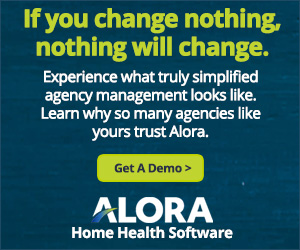
14 Nov What’s Coming in the Future of Home Health Care?
Homecare Trends and innovations to pay attention to
The landscape of home health care is evolving fast. These evolutions keep happening because of changing demographics, technological advancements, and shifts in the US economy. While no one can predict the future with certainty, it is always essential to explore the emerging trends and innovations that are reshaping the way we care for patients in their own homes. In this blog we’ll delve into some key trends and innovations in home care, drawing on insights from experts in the industry.
Workforce Challenges and Solutions
The home healthcare industry has been navigating challenges such as workforce and caregiver shortages since before the 2020 pandemic. Most reliable data indicates that this trend will only continue. Recruiting skilled caregivers and home health aides is difficult because of an aging population and increasing demand for services. Also, it’s a simple fact that most home care workers are not well paid. To improve their pay, agencies need to bill more, but with the government blocking universal health coverage, agencies won’t be able to expand their revenue enough to increase caregiver pay. In spite of these headwinds, the situation is not all that bleak. Many agencies are getting creative with their workforce solutions. These include but are not limited to:
- Instituting more attractive benefits
- Human development programs
- Improved training programs for unlicensed personnel
- Remote monitoring technologies
- Developing caregiver support networks
By deploying technologies such as better home health software, and expanding the pool of caregivers, agencies can rise to meet the workforce challenge.
Care Empowered by Technology
As eluded to previously, one of the most significant shifts in home health care is the use of technology for agency efficiency. Electronic Health Records (EMR homecare software), telemedicine, and wearable devices have already transformed healthcare in the 21st century. We can expect that transformation to continue at a rapid pace.
EHR systems allow for the seamless sharing of patient information between healthcare providers as well as patients, so that everyone stays on the same page and up to date with the patient’s current condition. Telemedicine platforms enable remote consultations and monitoring, reducing the need for in-person visits and offering greater convenience to patients. Wearable devices, like smartwatches, can track vital signs and health metrics, giving providers real-time data for early intervention.
Home care software has become indispensable. These platforms streamline administrative tasks and improve communication. Now your agency can implement efficient scheduling, billing, and documentation, an EVV system, thus reducing the administrative burden on caregivers and allowing them to focus more on patient care. Furthermore, these software systems facilitate secure communication among caregivers, patients, and their families, fostering better sharing of information. As a result, home health agencies can stay compliant with regulations like HIPAA while providing more coordinated, personalized care.
You may feel intimidated or overwhelmed by the size of our technological landscape and the speeds at which it changes. But have no fear. You don’t need to be a rocket scientist to navigate. It doesn’t take a long time to watch a few videos and develop a basic understanding, and a good software solutions company should always provide you with a free demonstration. Little by little, you can learn what you need to know.
The Shift Towards Value-Based Care
Value-based care means emphasizing quality over quantity. Instead of focusing on hours billed or your census or the number of patients discharged, more and more home health agencies are prioritizing their patients’ health outcomes. The patients’ overall satisfaction with the services they receive, and even their families’ opinions, now matter more than ever.
Value-based care focuses on achieving better outcomes and improved patient experiences while controlling costs. Home health agencies are now incentivized to provide high-quality, cost-effective care.
Look at what’s happening in various legislatures across the country. Lawmakers are constantly rewriting Medicare reimbursement models to tie payments to patient outcomes and satisfaction. These legislative and regulatory changes should inspire you to invest in enhanced care protocols, better customer service, and staff training and development.
Personalized Care Plans
Personalization aims to zero in on the unique needs and preferences of each patient. Personalized care plans consider a patient’s medical history, lifestyle, preferences, specific health goals, and even their home life. Patients and their families love to see a care plan that incorporates their actual lived experience. By tailoring home health care plans to patient needs, caregivers can enhance patient engagement and adherence to treatment — in other words, it’s easier to get an elderly person try a new routine or switch to a new medication. This approach also promotes a more patient-centered care experience, which is essential to value-based care (see above).
Care Coordination
The future will be all about care coordination — that is, multiple different clinicians, nurses, and specialists collaborating and sharing responsibility for holistic care. This coordination will also involve patients themselves, as well as their families, in order to ensure patients remain engaged, take their medication, stick to a diet, or adhere to a new routine or lifestyle. The days of one provider single-handedly taking on all of a patient’s needs are long gone, and they’re not coming back. We are looking forward to a time when every person, and not just senior citizens, can count on a full spectrum of family, loved ones, and medical providers (not to mention their therapist, nutritionist, and exercise coach) to look after them and support their overall health and well-being.
How will this utopian vision ever come to be? As we’ve established, current trends are pointing toward a future of value-based care, combined with technologies for communication and sharing information. That’s how agencies will be coordinating their patient’s care.
Home health agencies and caregivers must adapt to these changes. Medicare reimbursement models will play a significant role in incentivizing the industry to strive for better patient outcomes. As the home health care industry continues to evolve, it is vital for agencies and caregivers to stay informed to provide the best possible care to those who need it. By staying ahead of the curve and trying new approaches, we can look forward to a future where care is better than ever before.
Author’s Note: Views, information, and guidance in this resource are intended for information only. We are not rendering legal, financial, accounting, medical, or other professional advice. Alora disclaims any liability to any third party and cannot make any guarantee related to the content.
Additional Home Health Agency Blog Reading:

Alora’s home health software solution is ideal for agencies operating in both skilled and non-skilled care. For more than 16 years Alora has simplified workflow for countless agencies, helping them serve nearly 850,000 patients, while fostering growth and efficiency. Building a strong regimen of patient care starts with making your staff’s job as simple as possible. Alora’s home health technology makes everything involved with day-to day workflow easier, so agencies can thrive with simplicity.



No Comments